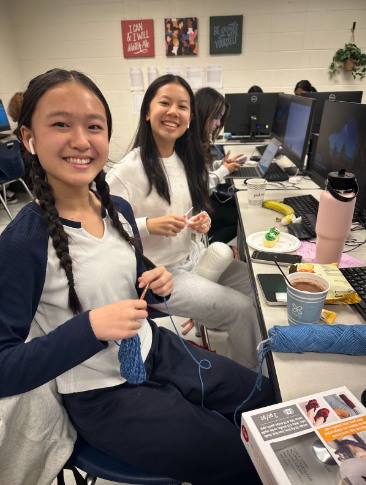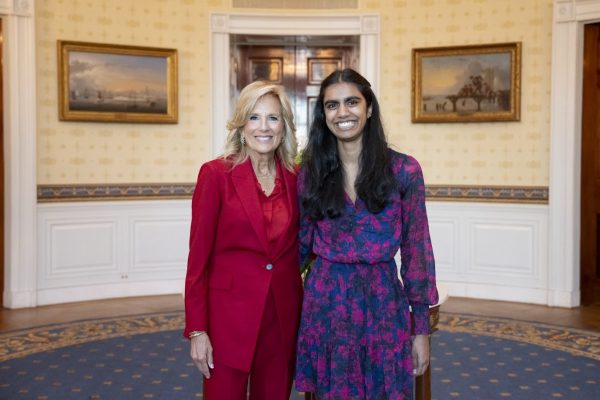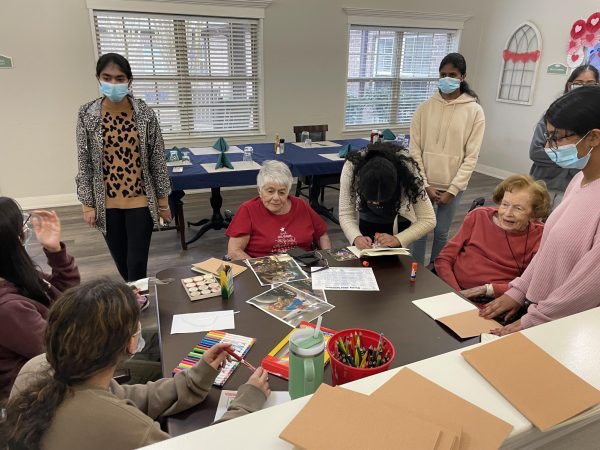Understanding forks in the educational road; trade jobs on the rise
A Honda odyssey waits on the car lift for a tire alignment.
College often seems like a gate-way into adulthood. Towering high with an even higher cost to pass though, many overlook other options.
Trade jobs, any profession requiring manual labor or mechanical skill, are opening up for people entering the workforce. As schools focus on higher education, less people find out about trade jobs. In fact, most trade jobs don’t require going to college .
Trade jobs cover a wide variety of occupations such as truck driving, welding and maintenance. Studies at Adecco show that there will be 31 million jobs open by 2020. Baby boomers filled these careers in the 60’s and 70’s. Now, with them retiring, new positions are opening.
“School,” junior Mckenna Spraetz says, ”only prepares you for how aggressive college is going to be”.
Schools are pushing for more students to attend higher education, so kids feel pressure that they need to go to college. From 2016 to 2026 there will be a projected 40.7 thousand job openings in mechanic work. There are also similar projected job openings for other trade work. Trade school is a good option for people who have a small budget for school. The total cost of some trade schools can be as little as $7,314 . Trade school only takes two years to complete, so people can start making money sooner.
“You don’t have to go to college for [trade professions] ,” Harold White states, ”Hands on training is the best ”
One way to start a trade job is to become an apprentice; someone who works along with a more experienced professional. Apprentice’s get on the job training and experience that they can actually use in the workplace. The United States Department of Labor states that people have employed over 329,000 apprentices since January of 2017.
While a proper college education is immensely beneficial, it is not necessary. In the interview follows, South Forsyth High School principal, Laura Wilson, explores the need for trade job training as well as college preparation in the high school setting.

Q: Do you know that there is a drop in trade jobs?
A: Opportunities for trade jobs have been in decline over the past few decades, but this trend has either slowed or reversed recently in part driven by fracking and cheap energy and a strong economy which drives construction (traditional and infrastructure). The construction of refineries and chemical plants, as one example, has increased significantly in the US in recent years. The other contributor to increasing need in the work force is new homes which need plumbers, carpenters, etc. and as we continue to rebound from the economic melt down of 2008, new homes/business construction is on the increase. Bottom line is that whether decreasing or increasing, the demand for trade skills far out paces the current labor supply.
Q: Why do you think that is?
A: Economy is on the rebound and many people believe a college degree is necessary for success overlooking the importance of more traditional, but essential, trade jobs.
Q: Do you think it’s important to go to higher education to be successful and why?
A: Higher education is a current trend but not an absolute necessity. Traditional college is not for everyone. Many people are quite successful going through an apprenticeship program, the military, trade school, technical school, and other alternative experiential routes to learning.
Q: Is too much attention put on college, why?
A: Attention on attending a four year institution of higher education varies by locality. There are areas in the country/world that do not focus all high school graduates on college attendance. In southern Forsyth County, our population largely encourages college attendance but not exclusively. Many of our students approach life from a different direction.
Q: What are some alternatives to college?
A: The military, trade school, technical college, junior college, apprenticeship programs in both large and small businesses, and on the job training are a few alternatives. Graduates are only limited by their imagination.
Q: What do you think is being done to shine light on alternatives to college?
A: The more recent focus on career ready skills and exposure to career opportunities in middle school and high school indirectly opens the conversation for alternative pathways after high school toward entering the work force. Dual enrollment opportunities at local technical schools also provide exposure for alternative routes. Trade/technical schools are represented along side more traditional colleges at college fairs for students. Scholarship opportunities for technical schools are more prevalent and advertised along with more traditional scholarships. More broadly, the Forsyth County Chamber of Commerce and the Forsyth County School system have partnered with the University System of Georgia to form a Work Force Development team looking at recruiting Forsyth County students into the workforce from all levels.
Q: Is there anything else you would like to add?
A: Pursue your passions in life. There are many opportunities to learn.Immediately after high school isn’t the only time attending college or any other educational opportunity is available. Keep your mind open to all the possibilities. Be a life long learner.
Trade school is more suited for those who prefer to work with their hands. On the other hand, college is more driven for other who have a desire to increase their vast knowledge in a variety of subjects. Some people would excel in a trade schools while others would be more successful in a more traditional college. Take time to find passionate interests and keep the countless options open.
Email: [email protected]
Twitter : @seely_douglas







